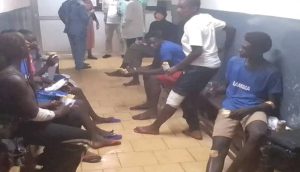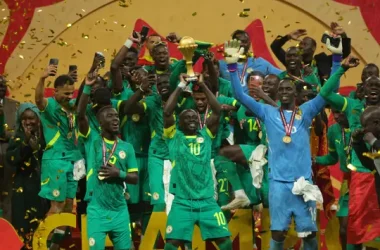The Gambian U-16 basketball teams have been repatriated by private jet following a road accident in Guinea, triggering a wave of public scrutiny over the government’s travel protocols for national sports delegations.
President Adama Barrow authorised the emergency airlift after the accident on Friday morning in Linsan, Kindia Prefecture, where the teams were traveling by road to Conakry for the FIBA Africa U-16 Zone 2 qualifiers. Several players and officials sustained injuries, though no fatalities were reported. All affected individuals are said to be in stable condition.
Youth and Sports Minister Bakary Y. Badjie, who announced the repatriation via social media, said the chartered aircraft would conduct two return flights to bring the players and officials back to Banjul. “A medical team from the Ministry of Health and EFSTH is being assembled at the airport to examine all victims and determine those who require further medical care,” Badjie wrote. “Those who don’t will be taken home by officials of the Gambia Basketball Association, who are also on ground.”
Health personnel and basketball association officials were on standby at Banjul International Airport as the first group of returnees arrived, offering medical checks and assistance with onward transport.
While many Gambians welcomed the president’s quick intervention, the mode of the team’s original travel has become the centre of national debate. Critics are questioning why the delegation was allowed to travel by road through Guinea a route widely known for its poor infrastructure and accident risk when air travel was ultimately available for their return.
“If we can afford a private jet in an emergency, why weren’t our athletes flown to the tournament in the first place?” asked one Gambian on Facebook. “This isn’t just about sports. It’s about how we value the lives of our young people representing this country.”

Others pointed out the broader implications for how sports delegations are treated, especially younger athletes. “These kids are ambassadors of the nation. It should never take an accident for the government to realise that their safety must come first,” said a parent whose child plays in the national youth league.
The Ministry of Youth and Sports has yet to respond directly to the criticism but has confirmed that a review of current travel protocols is being considered in light of the incident.

This accident and the emergency measures that followed has reignited conversations around the state’s investment in sports, athlete welfare, and basic planning for international competitions. With pressure mounting, many in the public and sporting community are calling for long-term reforms that go beyond crisis management.
As the nation awaits the full return of its young basketball players, attention now turns to what changes, if any, the government will implement to prevent such incidents in the future.





